Key Takeaways: Best Agile Certification
- An Agile certification will increase your marketability, job opportunities and earning potential.
- Agile certifications exist for new and experienced individuals who want to further their careers.
- The PMI-Agile Certified Practitioner (PMI-ACP) is the most well-known Agile certification, but all the options we have listed are industry-recognized.
If you’re a project manager, an Agile coach or an individual involved in an Agile team who wants to further their career and become an expert in the field, you owe it to yourself to take a closer look at Agile certifications. However, the market is littered with courses that claim to be the best, making it hard to determine which could be the best Agile certification for you.
In this Agile certifications guide, we’ll explain what the certifications are, how they can help you further your career and show you which are the best. No matter if you’re an experienced project manager or are just starting, we have found options for you that will help you earn more and become highly respected. Let’s take a closer look at Agile certifications.
What Is Agile?
There’s a lot of confusion surrounding Agile and project management methodologies that we’ll clear up here. Agile is a set of principles and values that were initially designed to help software developers overcome rigid and restrictive project management techniques like the Waterfall method that didn’t suit the fast-paced world of software development.
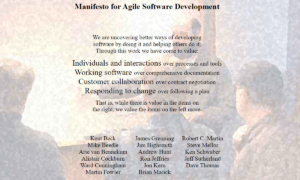
with traditional project management styles.
Over time, teams took the Agile principles found in the Agile Manifesto and applied them to many popular project management methodologies and frameworks like Scrum and Kanban, Scrumban, XP, Lean, Dynamic Systems Development Methods (DSDM) and others. If you want to learn more about Agile, check out our Agile guide.
Benefits of Agile Project Management
Agile methodologies have many benefits over rigid traditional methods. Agile teams are more flexible and can quickly adjust to meet changing customer demands. Communication and collaboration are championed and encouraged, and Agile methodologies are more adaptable and can work across numerous industries.

course correct quickly and efficiently.
In a nutshell, adaptability is the name of the game in Agile practices. If you’re a project manager, a product owner, a developer or an Agile team member who wants to progress in the field, you might want to consider getting an Agile certification.
What Is Agile Certification?
You might be wondering what an Agile certification is when there are specific certifications for Scrum management, like Professional Scrum Master (PSM), Certified Scrum Master (CSM) and Certified Scrum Product Owner (CSPO), and more general certifications for project management.
Agile certifications will help you show prospective employers that you have a firm grasp on Agile principles and values. They’ll also show that you can successfully manage an Agile team, are comfortable working in a fast-paced environment where rapid change can occur, and that you can communicate with stakeholders, team members and clients.
What Makes the Best Agile Certifications?
There are many factors to consider when picking which Agile certification you should pursue. The options we have gathered below have been chosen because they’re broadly recognized and respected. Let’s take a quick look at our picks. It’s worth noting that the courses are not listed in any particular order.
- PMI-Agile Certified Practitioner (PMI-ACP) — Ideal for experienced project managers and Agile team members.
- ICAgile Certified Professional (ICP) — An entry-level offering that helps establish an Agile mindset
- AgilePM Foundation — For current project managers and Agile team members who want to expand their Agile knowledge.
- SAFe Agilist — For individuals who want to work in scaled Agile environments.
- Certified Agile Project Manager (IAPM) — A certification that proves you have knowledge of Agile methods in Scrum, Kanban and Extreme Programming.
Now that you have seen the Agile certifications that we will be covering, it’s time to dig deeper into each of them so that you can get a better idea of what they will do for you, what requirements there are and how much each will cost.
5 Best Agile Project Management Certifications
Below, we will cover five of the best Agile certifications on offer. Whether you’re highly experienced or just starting your Agile career, you’ll find a certification that will suit you down to the ground. Let’s take a deep dive and help find the best certification for you.
PMI-Agile Certified Practitioner (PMI-ACP)
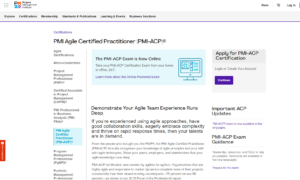
the most recognized Agile certifications available.
More information about PMI-Agile Certified Practitioner (PMI-ACP):
- Best For: Experienced project managers with plenty of Agile experience.
- Recommended Provider: Project Management Institute
- Cost: Non-Members $495, Members $435
- Requirements: Secondary degree. Twenty-one contact hours of training in Agile practices. Twelve months of general project experience in the last five years or PMP/PgMP certification. Eight months of Agile project experience in the past three years.
- Exam: Three-hour exam that has 120 multiple-choice questions
Pros:
- Highly respected certification
- Focuses on Agile practices
- Improves team management
Cons:
- Won’t appeal to traditional method users
- Different costs for non-PMI members
The Project Management Institute (PMI) offers the PMI Agile Certified Practitioner course to anyone who wants to prove their Agile abilities. This certification covers methods such as Scrum, Lean, Kanban and Test-Driven Development (TDD) and shows that you can manage teams, thrive in highly demanding situations and collaborate efficiently.
The PMI-ACP does have several requirements, including having 21 contact hours of training in Agile practices, which can vary in price depending on the provider. The exam features 120 multiple-choice questions and lasts three hours. Once certified, you must earn 30 professional development units (PDUs) each year to keep the certification current.
Becoming certified isn’t easy, but it can be lucrative. According to the Master of Project Academy, individuals with this certification can earn up to $120,000 annually. If you want to showcase your Agile skills and prove your Agile knowledge runs deep, the PMI-ACP could be for you.
ICAgile Certified Professional (ICP)
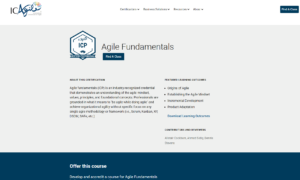
More information about ICAgile Certified Professional (ICP):
- Best For: Beginners
- Recommended Provider: Knowledge Hut
- Cost: Generally, $599 to $1,100 depending on discounts
- Requirements: No previous work experience is needed, but you must attend a 16-hour training class.
- Exam: Depends on the provider, but generally, there is no exam.
Pros:
- Ideal for new Agile managers
- Covers Agile fundamentals
- Industry recognized
Cons:
- Finding courses can be messy
- Certification costs vary wildly
If you’re just starting in project management and want to specialize in Agile or are a scrum master or product owner looking to expand your knowledge, the ICAgile Certified Professional (ICP) certification could be ideal for you. Sixteen hours of training will introduce you to Agile values, principles and foundational concepts.
Topics covered include the origins of Agile, how to establish an Agile mindset, incremental development and product adaptation. By the end of the course, you will know what it means to “be agile while doing Agile.” The course does not focus on one particular Agile methodology. Instead, it teaches you how to achieve organizational agility in any Agile method.
The course can be taken in person or remotely, and as a general rule, most providers do not require a final exam to pass, but that’s not to say every provider is the same. Some teachers may require an exam, and some will use other means to determine if you have learned enough. Reach out to your chosen provider to see how they grade the course. Prices vary by provider, but you can expect to pay between $599 and $1,100.
AgilePM Foundation
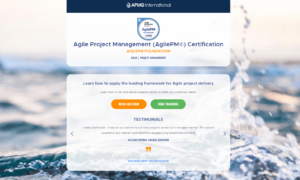
who want to learn Agile fundamentals.
More information about AgilePM Foundation:
- Best For: Current project managers, Agile team members.
- Recommended Provider: Training ByteSize
- Cost: $549
- Requirements: None
- Exam: Closed-book exam with 50 multiple-choice questions. The exam lasts 40 minutes. Passing grade is 50%.
Pros:
- Covers many Agile philosophies & principles
- Ideal for old & new users
- Global network of accredited training providers
Cons:
- Course prices can vary by country
The AgilePM Foundation certification is another fantastic option for individuals who want to pursue a career as an Agile specialist. The course covers core Agile values and fundamentals that are needed to successfully manage projects, including how to lay Agile foundations, project lifecycles and scopes, management styles and communication skills, roles and responsibilities, and more.
The 10-hour online AgilePM foundation course includes an exam voucher at the $549 price point. Once you have completed the coursework, you can take the 50-question exam. To pass, you must answer 25 questions correctly. With the AgilePM Foundation certification, you can move on to the more advanced AgilePM Practitioner certification.
SAFe Agilist
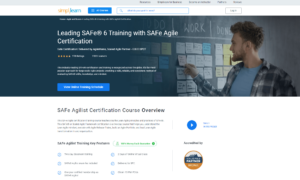
and certification should be on your radar.
More information about SAFe Agilist:
- Best For: Experienced project managers, scrum masters, executives, senior management and product managers.
- Recommended Provider: Simplilearn
- Cost: $699
- Requirements: A high school diploma or undergraduate degree is required. At least five years of software development, business analysis or project management experience is recommended. A basic understanding of the Scrum framework and Scrum principles is recommended. You must attend a two-day course before you can take the exam.
- Exam: One-and-a-half-hour multiple-choice exam with 45 questions. The passing grade is 34 out of 45.
Pros:
- Covers basic & advanced principles
- A leading course for scaled Agile framework methods
- Fee includes training & exam
Cons:
- Not for inexperienced individuals
- Yearly renewal fees
The SAFe Agilist certification is for those who wish to further their scaled Agile framework knowledge. Students will learn how to manage Lean portfolios, support LeanAgile, configure Agile frameworks, execute Agile release trains, coordinate value streams and apply SAFe methods to projects.
The course also covers many more areas, including how to become a LeanAgile leader, build business solutions, establish teams and technical agility, and more. The SAFe Agilist course is not for newcomers and requires applicants to have a thorough knowledge of Scrum and Agile values and principles.
The course is highly regarded and is available through many accredited organizations. The $699 course takes two days to complete and comes with an exam voucher. By completing the training, you’ll earn 15 PDUs, and by passing the exam, you will receive a one-year SAFe Agilist certificate. The certificate must be renewed yearly, which costs $100.
Certified Agile Project Manager (IAPM)
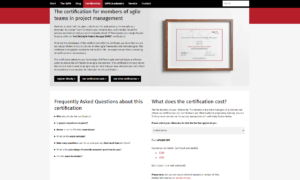
More information about Certified Agile Project Manager (IAPM):
- Best For: Agile team members.
- Recommended Provider: International Association of Project Managers (IAPM)
- Cost: Roughly $530 depending on exchange rate
- Requirements: None
- Exam: You get 80 minutes to answer 120 multiple-choice questions. The minimum passing grade is 65%.
Pros:
- Lifetime certification
- No experience needed to apply
- Covers many Agile frameworks
Cons:
- Course prices can change depending on exchange rates
The final Agile training on our list is the Certified Agile Project Manager certification that the International Association of Project Managers (IAPM) offers. This training course and certification are open to anyone who wants to further their Agile career. No previous experience is necessary to take the course.
The self-paced course covers everything from Scrum to Kanban to Extreme Programming. You’ll also learn about team management, communication and collaboration. You’ll learn how to handle conflict management, product visions and environments, sprint planning, meetings such as standups and sprint retrospectives, and more.
When ready, you can take a mock test before the actual exam. Once you become certified, you do not need to worry about renewing your certification, as it lasts a lifetime. This course is ideal for new and experienced individuals who want to prove they have the skills and knowledge to work successfully in Agile environments.
Benefits of an Agile Certification
Agile certifications show prospective employers that you’re a great communicator and collaborator, have a sound knowledge of Agile values and can thrive under the pressure of rapidly changing scenarios.
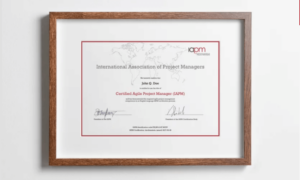
earning potential and enhanced credibility.
Proving you have these skill sets will open the door to increased pay rates. You’ll earn respect from your peers and will benefit from increased marketability. You’ll also find that an Agile certification will improve your confidence and credibility. There are many reasons to become an expert in your chosen field, but these are the top benefits of becoming certified.
Final Thoughts: Agile Project Management Certifications
The Agile project management field is competitive. To get ahead, you need to stand out from the crowd. The best way to get noticed is to obtain an Agile certification. Sure, the certifications aren’t cheap, but there’s nothing better than investing in yourself. If you want to increase your knowledge, land a new job, earn more and gain respect, get your hands on a certification.
Do any of the certifications covered above pique your interest? Which certification will you be trying to obtain? If you have already become certified, do you have any advice for potential students? Let us know in the comments, and as always, thanks for reading.
FAQ: Agile Certification
-
The most respected and well-known Agile certification is the PMI-Agile Certified Practitioner (PMI-ACP). However, it is worth mentioning that all of the certifications listed above are recognized across the project management industry.
-
Yes. If you want to increase your credibility and earning potential and gain respect from your peers, getting an Agile certification is the way to go.
-
The Project Management Professional (PMP) certification is best for those who want to show they understand traditional and Agile methods. An Agile certification is best for individuals who only want to specialize in Agile methodologies.
-
There is an Agile Manifesto created by software developers that laid the foundations for Agile as we know it today. Still, there’s no official course or certification.
{“@context”:”https:\/\/schema.org”,”@type”:”FAQPage”,”mainEntity”:[{“@type”:”Question”,”name”:”What Is the Most Respected Agile Certification?”,”acceptedAnswer”:{“@type”:”Answer”,”text”:”
The most respected and well-known Agile certification is the PMI-Agile Certified Practitioner (PMI-ACP). However, it is worth mentioning that all of the certifications listed above are recognized across the project management industry.\n”}},{“@type”:”Question”,”name”:”Is Agile Certification Worth It?”,”acceptedAnswer”:{“@type”:”Answer”,”text”:”
Yes. If you want to increase your credibility and earning potential and gain respect from your peers, getting an Agile certification is the way to go.\n”}},{“@type”:”Question”,”name”:”Which Is Better, PMP or Agile Certification?”,”acceptedAnswer”:{“@type”:”Answer”,”text”:”
The Project Management Professional (PMP) certification is best for those who want to show they understand traditional and Agile methods. An Agile certification is best for individuals who only want to specialize in Agile methodologies.\n”}},{“@type”:”Question”,”name”:”Is There an Official Agile Certification?”,”acceptedAnswer”:{“@type”:”Answer”,”text”:”
There is an Agile Manifesto created by software developers that laid the foundations for Agile as we know it today. Still, there\u2019s no official course or certification.\n”}}]}
The post Best Agile Certification in 2023: Become a Certified Agile Practitioner appeared first on Cloudwards.

